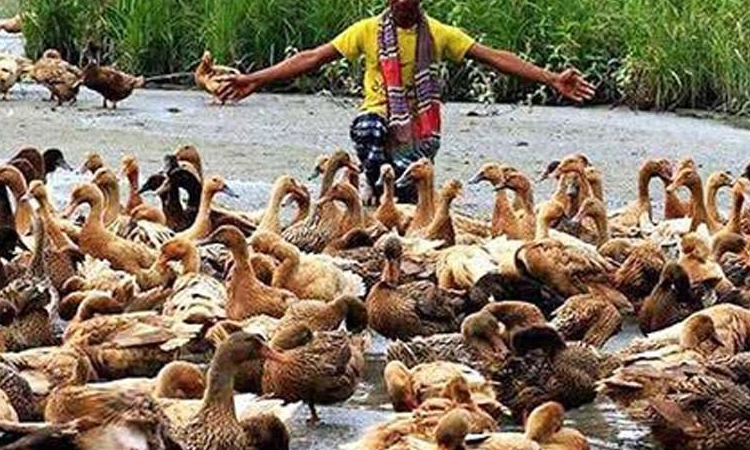News Flash
News Flash

By Md Aynal Haque
RAJSHAHI, April 21, 2025 (BSS)- Many people, particularly the marginalized ones, have become self-reliant through duck farming along with trading in the region, including its vast Barind tract.
At present, duck farming has become a successful and reliable income source in the region, particularly for poor and marginal families, and has also promoted small-scale entrepreneurship.
Many families have achieved economic solvency through duck rearing, especially in areas with beel (low-lying areas) and wetland environments
Rubel Islam, 35, a resident of Bakshimoil village under Mohanpur Upazila who used to sell his labour earlier, has now become financially solvent through duck farming contributing to society in many ways.
At the beginning, he ventures with around 300 chicks. He sells 300 to 350 eggs a day on average besides selling ducks in wholesale markets. In this way, he earns a profit of around Taka 20,000 to 25,000 per month on an average.
"I couldn't get the scope of institutional learning due to poverty that forced me to sell labour on others' land," said Rubel Islam, adding the worst situation has been overcome at present.
Ashraful Islam an inhabitant of Buzrukula village in Bagmara Upazila of the district has become an icon in his locality in terms of attaining economic emancipation side by side with boosting his level of confidence through duck farming for the last couple of years.
Presently, he has around 1,500 ducks, including around 1,000 egg-laying ones, on his farm generating the path of earning around Taka 15 lakh yearly on average.
He is selling eggs at Taka 14.50 per piece from his farm regularly, saying the demand of duck-egg has enhanced to a greater extent at present. In the wholesale markets, the egg is being sold at Taka 16 to 18 per piece according to size.
"I have launched the venture with 100 Campbell species chicks when I was a first year undergrad student in 2019," said Islam, adding that he's increasing the duck population gradually since then.
"I bring one-day-old duck chicks to rear them for four months till they start giving eggs. Every day I have to spend around Tk 5,000 for their food, medicine and my employee's salary. The upazila livestock office supplies vaccines," Islam added while sharing his journey to BSS.
He also said he now gets 900 eggs daily on an average throughout the year and makes a profit of around Tk 1.35 lakh per month.
At this time he has built the ever-biggest farm in the area inspiring many of his co-villagers to follow the potential way.
Upazila Livestock Officer Dr Ahsan Habib told BSS, apart from Rubel and Ashraful many others have found the path of becoming self-reliant through duck farming.
"We are providing training, technical and other consultation services to the farmers in this field," he added.
Ducks need less expensive, simple and non-elaborate housing facilities resulting in very low cost for setting up commercial duck farming businesses. They are very hardy birds and they need a smaller amount care or management.
They can adapt to almost all types of environmental conditions. The ducks are mostly fed homemade feed in addition to what they are deriving from scavenging facilities.
Most of the farmers provided rice polish, boiled rice and broken rice as supplementary feed ingredients to ducks either singly or in combination.
There are more than 3,000 duck farms in Rajshahi division comprising eight districts and its farming has become more profitable and sustainable, where beel areas and wetlands are situated, said Dr. Md Abdul Hai Sarkar, Divisional Director of Department of Livestock Services.
"Commercial farming of ducks, including geese, is gaining popularity in the region, including its vast Barind tract, for the last couple of years in the wake of gradually increasing nutritional demand and lucrative market prices", Sarkar added.
Duck products, such as eggs and meat, have a great demand in the local markets. So, commercial duck farming is being judged as a great source of earning.
Many successful farmers are making a standard profit from their duck farming business. Duck farming has also become a stable employment source. Young unemployed educated people are joining the business.
Hundreds of poor and marginal families have become economically solvent by rearing ducks.
Sharing his expertise to BSS here Sunday Prof Dr Jalal Uddin Sarder said duck farming has diversified aspects of eradicating various social problems related to poverty, unemployment and malnutrition in particular.
Duck rearing has been contributing a lot towards mitigating the problems related to livelihoods as women, particularly housewives, are mostly involved in rearing ducks of indigenous species.
Duck farming has now been a reliable source of promoting small-scale entrepreneurship in both rural and urban areas in the region as many unemployed people become self-reliant in this field.
Prof Jalal Sarder, who teaches at the Department of Animal and Veterinary Science at Rajshahi University, opined that the Use of natural feed resources in an increasing manner may help overcome the existing feed problem.
Regular vaccination and the use of cost-effective balanced diets can have a decisive effect on duck rearing.
As a whole, there is great potential for an improvement of native duck production in the region using nutritional and management, Prof Sarder added.